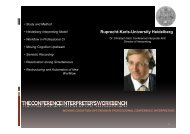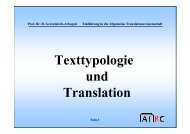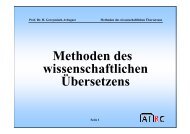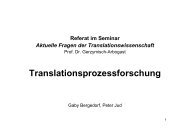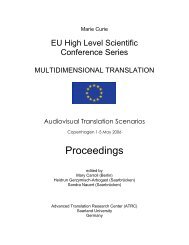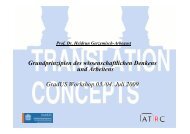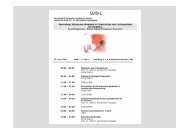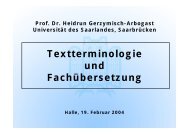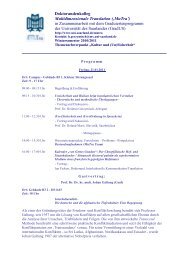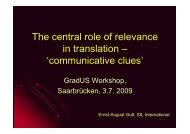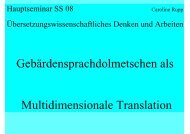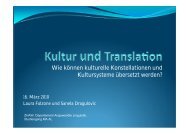Proceedings - Translation Concepts
Proceedings - Translation Concepts
Proceedings - Translation Concepts
Create successful ePaper yourself
Turn your PDF publications into a flip-book with our unique Google optimized e-Paper software.
MuTra 2005 – Challenges of Multidimensional <strong>Translation</strong>: Conference <strong>Proceedings</strong><br />
Annalisa Sandrelli<br />
the available literature, an assessment grid was compiled for subjects to use in assessing a<br />
number of interpreting performances. Trainees, trainers, professional interpreters and users<br />
were involved in the study, which revealed that the ability to assess and describe quality<br />
interpreting evolves with training. In particular, there is huge variation in students’<br />
understanding of some attributes commonly used to evaluate an interpreting performance,<br />
including, for example, accuracy and fluency. In other words, to improve their selfassessment<br />
skills, students, and particularly trainees, need extensive guidance, preferably<br />
through co-assessment exercises carried out in class.<br />
This brief analysis has shown that the structure of most interpreter training courses<br />
relies heavily on autonomous learning, which makes interpreter training a prime candidate for<br />
the development of dedicated computer software. In this sense, CAIT (Computer Assisted<br />
Interpreter Training) tools should be seen as a useful integration to traditional methods, not as<br />
a replacement of interpreting classes. However, the implementation of such software tools<br />
will require a shift in the educational approach. As this brief description of interpreter training<br />
has highlighted, the latter is very trainer-centered. Hartley et al. (2003:2) neatly summarize<br />
the situation as follows:<br />
Currently, many if not most interpreter training programs still apply a trainer-centered approach<br />
where expert-trainers, as the source of expertise and authority, play the major role in judging and<br />
assessing trainee interpreters' performance. However, the acquisition of interpreting skills by<br />
trainees requires not only professional guidance during classes, but also extensive practice outside<br />
these hours […]. In reality, therefore, trainee conference interpreters rely heavily on group practice<br />
and feedback from peers – targeting both language proficiency and communicative competence –<br />
to advance their interpreting skills and performance.<br />
The following section 3 outlines how the Interpretations project aimed to address these<br />
concerns.<br />
3 Developing a CAIT prototype tool: Interpretations<br />
3.1 Basic overview of the project<br />
Interpretations was the practical output of a doctoral research project carried out at the<br />
University of Hull (UK) between 1999 and 2002 with financial support from the European<br />
Commission under the Marie Curie Training and Mobility of Researchers Program. 5 The<br />
software was developed in cooperation with Jim Hawkins, an experienced computer program<br />
who had already been commissioned to undertake software development work by the<br />
University in connection with other projects. As was mentioned in (2), the basic idea was to<br />
investigate how to exploit the potential offered by computer technology to complement<br />
teaching methods traditionally used in interpreter training, along the lines of what was being<br />
done through Computer Assisted Language Learning (CALL) for foreign language teaching<br />
and learning.<br />
The University of Hull was at the time the headquarters of the EUROCALL association<br />
and lead site for the TELL Consortium, 6 which had produced the only existing computer<br />
5 EU contract number ERBFMBICT983512.<br />
6 The C & IT Centre for Modern Languages (formerly CTI Centre for Modern Languages) of the University of<br />
Hull used to host EUROCALL, the European Association for Computer Assisted Language Learning, and the<br />
196



